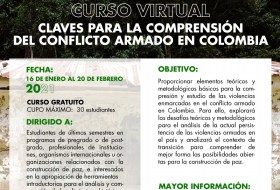News
Colombo German Institute for Peace and University of Cauca promote virtual training for understanding the armed conflict
The virtual day scheduled for the months of January and February 2021, seeks to contribute to strengthening academic collaboration networks between Colombia and Germany.
The University of Cauca, through the Anthropology program, with the support of the Colombo German Institute for Peace CAPAZ, will carry out the virtual course "Keys to understanding the armed conflict in Colombia." The academic day scheduled from January 16 to February 20, 2021, is part of an initiative of the CAPAZ Institute for the consolidation of a School of Virtual Courses, which contribute to strengthen academic collaboration networks between Colombia and Germany, including others countries and communities.
"For the Department of Anthropology and the University of Cauca, the course is part of the process of constitution of a line of teaching and research, in which it has been working for some time in articulation with increasingly broad academic networks," said Axel Rojas, professor in the Department of Anthropology and Academic Coordinator of the Virtual Course.
It is expected that the calls made through networks in different countries, mainly Germany and Colombia, guarantee a broad participation of students, linked to training programs, research projects on the armed conflict and peacebuilding programs. On the virtual course, it will last fifteen hours of synchronous work and among the teachers who will guide the course are:
Gonzalo Sánchez, professor at the National University, former director of CNMH.
Andrés Suárez, ex-CNMH researcher, Coordinator of the Memory and Conflict Observatory.
Natalia de Marinis, researcher at Ciesas Golfo, Mexico
Jennifer Vargas Reina, Land Observatory, National University of Colombia.
Stefan Peters, JLU Gießen - CAPAZ Institute.
Jonas Wolff, Peace Research Institute Frankfurt (PRIF) (Germany).
Teófilo Vázquez, (former CNMH researcher).
Silvia Monroy, Department of Anthropology, University of Cauca.
John Edison Sabogal, Unit for the Search for Missing Persons.
The course will be free for registered students and its work materials, including videos, readings and other educational resources, will remain freely accessible once the course sessions have concluded.
They can aspire to apply for a quota:
- Undergraduate students in the last semesters with institutionally recognized research projects on armed conflict and peacebuilding (resolutions of degree work or registration before university bodies)
- Postgraduate students with research related to the subject, institutionally recognized
- Professional researchers on the armed conflict or related to peacebuilding programs.
More Info:


